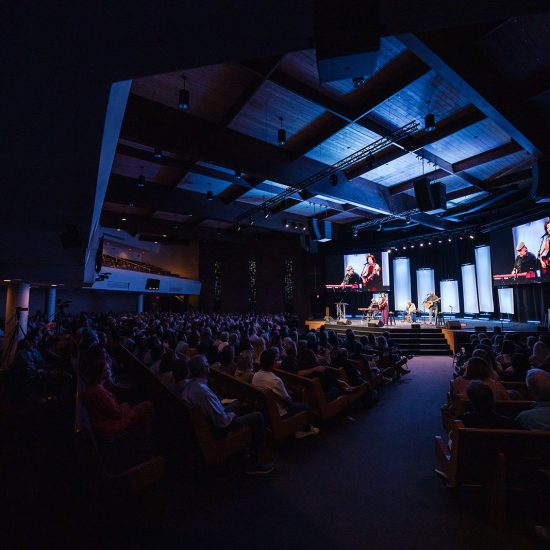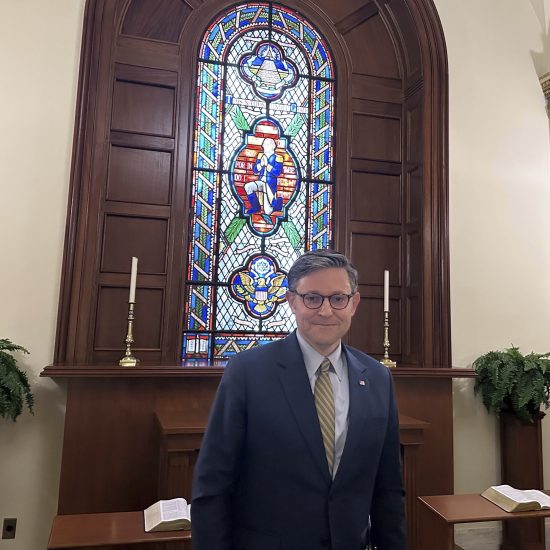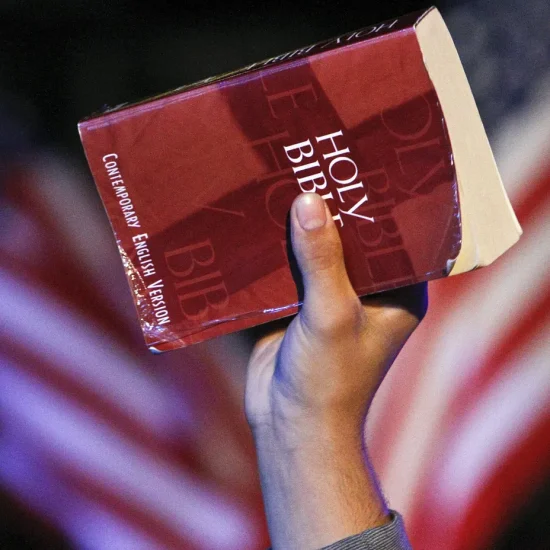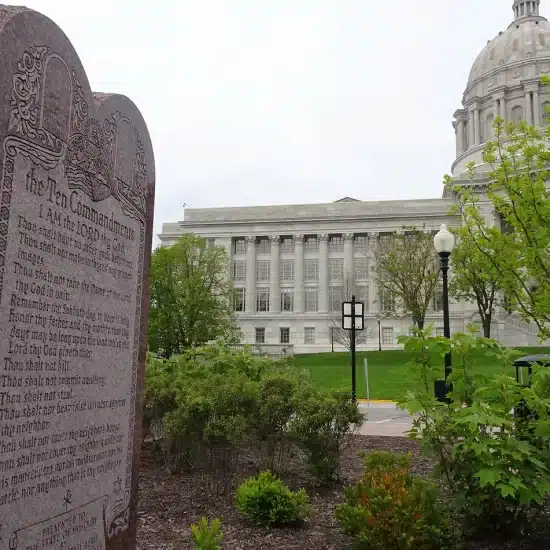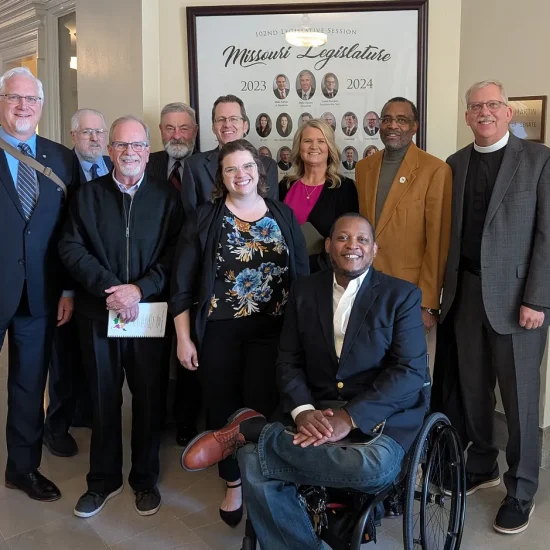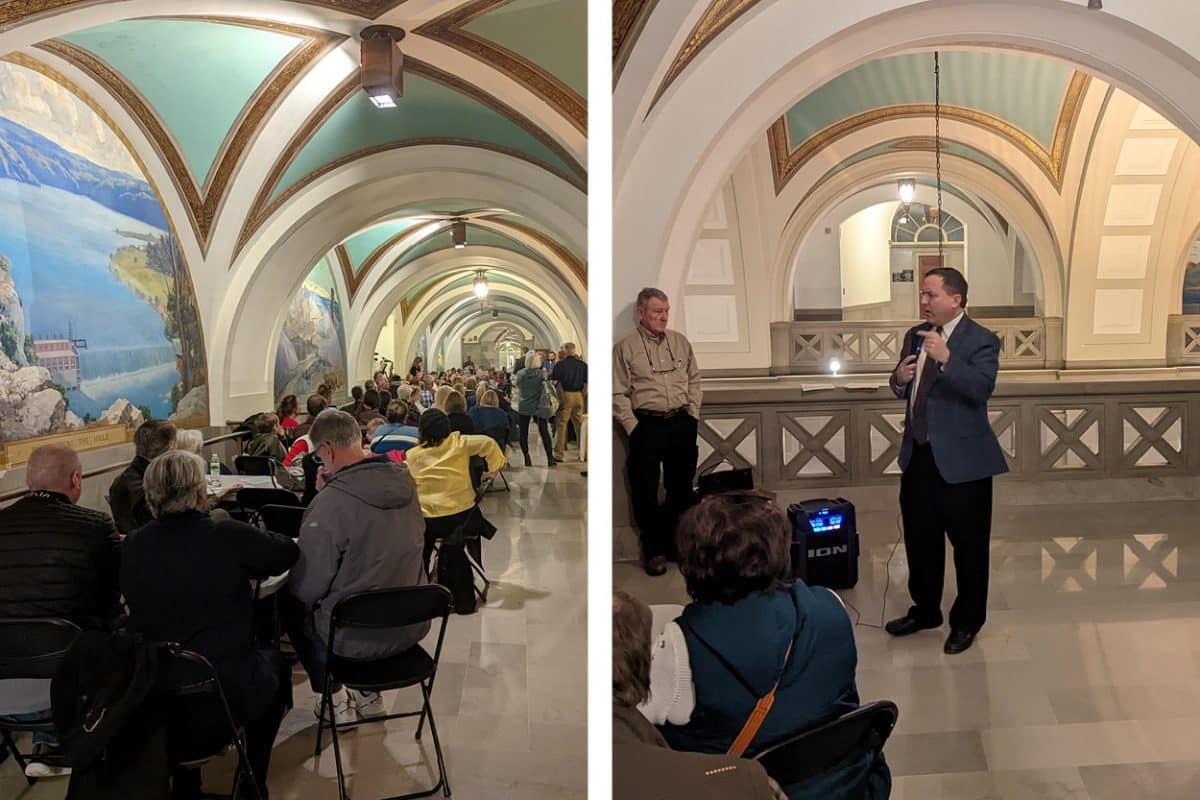
“This is ‘such a time as this.’ I believe God called us here to serve with your blessing.”
That’s how Missouri State Rep. Sara Walsh, a Republican and a Baptist, on Monday (Feb. 7) described the legislative push to redraw the state’s U.S. congressional map to send more Republicans to Congress. She rhetorically baptized the gerrymandering effort in a rally at the statehouse that started with a prayer walk for a more partisan map.
Walsh said that it was good to start this political rally with prayer “just like we start session in prayer every day.” And looking at the crowd of a 100 or so conservative activists standing in a hallway in the Capitol, she added that “God can do great things even with small numbers. He did that all throughout the Bible.”
Missouri currently sends six Republicans and two Democrats to the House of Representatives, but some conservative state lawmakers want to move from that 6-2 map to a 7-1 arrangement. That in a state where Donald Trump beat Joe Biden by a 57%-41% split (which if you do your math would be quite close to a 5-3 map, but let’s not pretend math — or theology — is a strong suit for our lawmakers). The so-called “7-1 map” targets the seat of U.S. Rep. Emanuel Cleaver, a Democrat and a United Methodist minister.
So, Walsh encouraged the crowd that they could get the 7-1 map passed “by the grace of God and the overwhelming support of Trump-supporting Missouri.” This would help them win the fight against “radical, America-hating, God-hating socialists in Washington, D.C.,” who “want to make government our god.”
Walsh wasn’t alone in her crusade for the more partisan redistricting effort. Rep. Brian Seitz, a Republican and a Baptist pastor, urged people to stand up without fear for a 7-1 map. He declared, “My Bible says ‘fear not.’ We need to stand.”
The activist emceeing the event, Jodi Widhalm, similarly cast this redistricting effort as a divine mission. In a moment of biblical hermeneutics akin to preachers comparing Donald Trump to King Cyrus because Cyrus is mentioned in Isaiah 45 and Trump was the 45th president, she kicked off the prayer rally for the 7-1 map by reading from Psalm 7:1. In that verse, David claimed God will save him from his pursuers (who may or may not have wanted to redistrict Jerusalem). This kind of textual gerrymandering is dangerous because one could easily retort about the proposed map with Judges 7:1 where “the Israelites were unfaithful in regard to the devoted things” and “so the Lord’s anger burned against Israel.”
But Widhalm saw God at work in the partisan rally. She declared about the state Capitol: “We’re going to claim this territory back for the Lord.”
In her prayer she thanked God “that you gave our founding fathers the wisdom and the direction to create this system for us.” She added that this push for a 7-1 map “is all in an effort for you, that we would live in a godly nation that glorifies you, that we can raise you up so that people ultimately would be saved.”
“Holy Spirit, just fill us with a new anointing and a new passion and a new energy that the words we speak in these [Senate] offices would be your words and not ours, that they would carry a divine power,” she added. “We know that with you all things are possible. All things are possible. We know that with you Peter walked on water. We know that with you Esther saved her people. We know that because of you lions’ mouths can be shut, that we can walk through fire and survive and thrive even in the midst of what seems to be great turning away. So, Father, we just pray that you would come into this building today.”
Other speakers at the rally explicitly explained the partisan goal of gaining more power for Republicans, weaving into their remarks comments about “fraud” in the 2020 election, problems with government efforts to reduce COVID, the “Jefferson City swamp,” and the dangers of socialism. Joining state lawmakers and anti-abortion activists in in offering remarks was Republican Secretary of State John Ashcroft, who previously argued for a 7-1 map and against ballot initiatives because he believes in God instead of democracy.
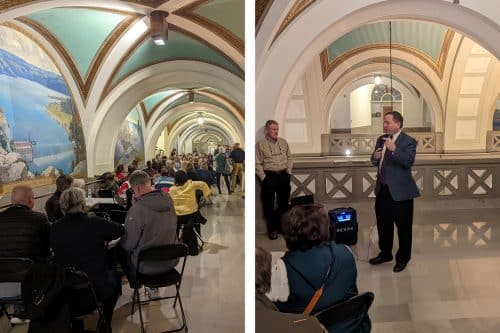
Left: Attendees gather for the prayer rally in support of a 7-1 map at the Missouri Capitol on Feb. 7, 2022. Right: Missouri Secretary of State John Ashcroft speaks at the rally. (Brian Kaylor/Word&Way)
In the middle of the event, the group took a half-hour pause for attendees to walk around the Senate office area in the Capitol. Some prayed as they strolled the hallways; others stopped into offices to evangelize for the 7-1 map. Hours later as the Senate session started, some from the group loudly prayed outside the chamber, though they didn’t recite the Lord’s Prayer like at the anti-vax rally last week that was organized by the same conservative Christian activists.
This partisan fight in Missouri might invoke more Christian rhetoric than in other states, but the questions about gerrymandering, partisanship, and representation aren’t unique to the Show Me State. In this issue of A Public Witness, we count the fights over redistricting and the relative quietness from Christians amid this partisan fight. Then we map out what values Christians should push amid redistricting squabbles.
Primary Focus
It all started with a cartoon. Back in 1812, Jeffersonian Republicans in Massachusetts drew a warped district for their political benefit. Gov. Elbridge Gerry, who would later become vice president, signed off on the map. Noting the peculiar shape resembled a salamander, the Boston Gazette combined the governor’s name with that of a lizard and pronounced in a political cartoon the discovery of a “new species of monster” called “The Gerry-mander.”
The practice has continued ever since, though in ways that are far less funny. It was used to reduce the influence of Black voters in the South after the post-Civil War expansion of voting rights. The power of rural areas was preserved at the expense of urban cities. Supreme Court rulings in the 1960s helped correct some of the most egregious abuses by articulating a constitutional standard of “one person, one vote” and forcing the regular redrawing of district lines.
That requirement brought its own unintended consequences, as advances in computer technology and more sophisticated data analysis allowed lawmakers to draw increasingly sophisticated maps that technically followed the law but were clearly designed to serve their political ends. As the Brennan Center for Justice’s Michael Li told The Atlantic in 2017, “State mapmakers now know a lot more about voters. That’s just an extension of the big data revolution that you also see in marketing and other politics.”
And just like that salamander district 200 years ago, our gerrymandering today creates some maps that on their face are clearly wrong. Like the “earmuffs” in Illinois, the “mantis” in Maryland, and the “seahorse” in North Carolina.

From left: The Boston Gazette carton of the “Gerry-mander” district, the “earmuffs” in Illinois, the “mantis” in Maryland, and the “seahorse” in North Carolina.
The results are devastating for democracy. As Reid Epstein and Nick Corasaniti reported in the New York Times over the weekend, fewer than 40 of the 435 seats in the U.S. House of Representatives are likely to be competitive in general elections when this year’s redistricting process is complete. Both Republicans and Democrats are guilty parties when it comes to this political crime.
In New York, the “skills” of Democratic cartographers are likely to increase party control to 85% of the state’s house delegation (up from 70%) and provide a three seat gain. The map passed by Democrats in Illinois is designed to yield an extra seat for their party despite the state’s delegation decreasing from 18 to 17 members (full disclosure, one of us, Beau, previously worked on the political campaigns of Rep. Bill Foster, who currently represents Illinois’s 11th district). Meanwhile, Republicans are playing their own games in Texas, Florida, Tennessee, and — of course — Missouri. Kansas Republicans on Monday failed to override the Democratic governor’s veto of their partisan map.
The immediate result is a bevy of legal challenges. Republicans overreached in some states, sparking court challenges alleging new maps violate the Voting Rights Act of 1965. State supreme court justices in both North Carolina and Ohio sent their legislatures back to the drawing board by rejecting nakedly political maps benefitting the GOP. And a panel of federal judges in Alabama struck down that state’s map – but the U.S. Supreme Court blocked that court action in a 5-4 ruling on Monday.
The longer-term consequences are more problematic. Creating more partisan districts changes the calculations of candidates. No longer worried about losing a general election, the major threat now comes in the form of primary challengers. That shift incentivizes candidates to play to their respective bases. Thus, candidates desiring reelection increasingly adopt extreme positions and demonize the opposing party, which moves both parties farther from the middle. The result is fewer members of Congress personally willing or politically able to strike the compromises required by our democratic governance.
Gerrymandering might make for great politics, but it encourages policy gridlock.
Help sustain the ministry of Word&Way by subscribing to A Public Witness!
Minority Protests
Despite its importance to how power is structured and policy is formulated in both Washington, DC and state capitals, few Christian leaders invest their time and energy in addressing redistricting. Perhaps the reluctance is due to the issue’s legal complexity complicated by arcane legislative processes. Or, more cynically, it may be connected to the complicity of both parties. Even Christian leaders demonstrate reticence in calling out the bad behavior of their own political tribe.
One voice that has not been silent is Rev. William J. Barber II, the social activist and Disciples of Christ pastor who leads Repairers of the Breach and the Poor People’s Campaign. He regularly makes the connection between past practices of racial oppression, ongoing racial injustices, and the role of gerrymandering.
“We must start connecting systemic racism, most seen through systemic voter suppression and gerrymandering, poverty, the lack of healthcare, environmental devastation and the war economy,” Barber told Democracy Now! in a 2017 interview about his protests then against the North Carolina legislature’s actions.
He added: “More people [in North Carolina] voted for progressives, but because of racist gerrymandering, [conservative legislators are] in office. Now what they do is they use the power that they’ve obtained through racist gerrymandering to deny healthcare to 500,000 people, to deny living wages, to attack women, to attack the gay community. So it’s connected. They would not have the power to do what they’re doing without racist voter suppression and racist gerrymandering.”
Several of the legal challenges against Republican maps referenced above center around the alleged violations of the Voting Rights Act and other issues related to minority representation in Congress. Others charge Democrats with exploiting the law for their own gain. Clearly, realities of both past and present make it impossible to divorce the issue of gerrymandering from larger questions of race.
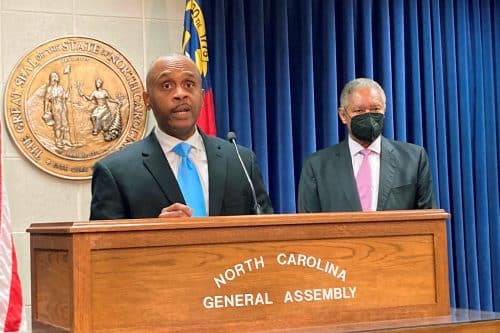
Democratic lawmakers in North Carolina speak on Feb. 7, 2022, about the congressional maps in their state after the North Carolina Supreme Court rejected the redistricting effort. (Gary D. Robertson/Associated Press)
While conservative Christians in Missouri bathed the push for a gerrymandered map in prayer, pastors in other states have pushed back against redistricting plans. In particular, Black ministers in both Republican and Democratic states have argued against maps they fear would water down the vote of Black communities. This includes clergy in California, Michigan, and Tennessee. In the latter state, a newly-formed group, the African American Clergy Collective of Tennessee, announced it would sue in an effort to block the proposed new map.
“It is morally and ethically wrong, and we cannot allow the political trajectory of our state to be solidified for the next 10 years without the African American community, but particularly the African American church, speaking up on behalf of having equitable maps that are drawn so that all of us get the representation that we deserve,” explained Rev. J. Lawrence Turner, chair of the collective’s steering committee and senior pastor of Mississippi Boulevard Christian Church in Memphis.
And in Indiana, an interfaith group of clergy argued last fall that gerrymandering is “political and theological idolatry.” They even protested with signs like “WWJD?: What Would Jesus Draw?” and “Blessed are the mapmakers for they shall restrict the children of God.”
Get cutting-edge analysis and commentary like this in your inbox every week by subscribing today!
Redrawn Values
Despite the fierce attention to redistricting in state legislatures across the country, we primarily see Black clergy speaking up about how their communities will be affected and some conservative White Christians pushing for greater political power for their side. Is there more that Christians can contribute to this national conversation?
Daniel K. Williams, a professor of history at the University of West Georgia and author of The Politics of the Cross: A Christian Alternative to Partisanship, told us that “as Christians consider the issue of partisan-driven redistricting, we need to ask ourselves which is more important: getting more members of our own party elected to Congress or preserving the principles of representative democracy so that the representatives who are sent to Congress fairly reflect the views of the voters who cast their ballots in the previous election.” The right answer might seem obvious, but Christians often choose the former.
“Too often, American evangelical Christians have cared more about their ideology than about democracy. Because they believe that so much is at stake in their single-issue causes — such as the principle of human life when it comes to abortion, for instance — they have made securing political victories on those issues a higher priority than preserving democracy,” Williams noted.
“The Christian principle of considering others’ interests above our own would seem to suggest that if the opportunity presents itself for our side to gain victories by weakening the influence of the votes of people on another side, Christians will not seek to gain this partisan advantage through undemocratic means,” he added. “Instead, we’ll model the alternative principle of seeking to make sure that every voter is treated fairly, regardless of whether they support our partisan causes.”
Similarly, Adam Taylor, president of Sojourners and author of A More Perfect Union, told us that “Christians should oppose partisan gerrymandering, regardless of which party is doing it.” He noted that the fruit of the Spirit that Paul taught in Galatians — love, joy, peace, patience, kindness, goodness, faithfulness, gentleness, and self-control — is “desperately needed today.”
“Sadly, our electoral system increasingly rewards and perpetuates antithetical ‘fruits’ — such as contempt, hate, fear, and an us-versus-them and zero-sum mindset,” he added. “Gerrymandering is one of the reasons for this.”
Taylor noted that gerrymandering makes “Congress more polarized,” which then makes our politics more polarized. He added, “This vicious cycle contributes to the ever-worsening toxic polarization in our culture, politics, and beyond.”
We agree with Williams and Taylor. The last thing we need is a Christian witness reduced to the partisan christening of gerrymandered maps. Just because we have normalized this type of political combat doesn’t mean Christians should accept it. An ethic where anything goes, where the ends justify the means, or where one side’s bad behavior justifies the other side acting in the same bad fashion might work in the contemporary political arena, but it doesn’t hold up to the light of the gospel.
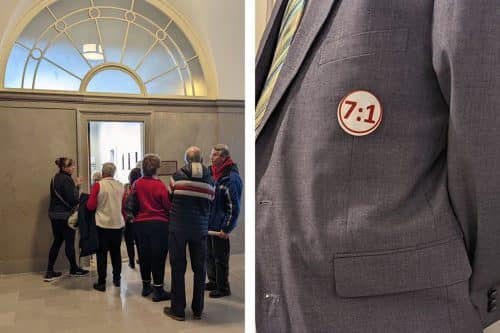
Left: Some attendees at a prayer rally for a 7-1 map in Missouri stand outside a senator’s office on Feb. 7, 2022. Right: A man at the rally sporting a sticker in favor of the more gerrymandered map. (Brian Kaylor/Word&Way)
Confusing the elephant or the donkey with God’s Kingdom can lead to some ungodly politics (and some ungodly drawn maps). We’re not naive enough to believe these structures will instantly change, but we still believe Christians must speak the obvious truth that gerrymandering is wrong regardless of which party engages in the practice.
We won’t equate democracy with the will of God. But a core value articulated by both democracy and the Bible is the inherent value and dignity of every person. Gerrymandering undermines that principle of equality. In putting party power above equal representation, gerrymandering actively works against the flourishing of our democratic life and the notion that each person’s voice and vote should count for something.
Gerrymandered maps symbolize a larger problem that needs to be faced. For in their creative shapes, we see a caricature of our own values.
As a public witness,
Brian Kaylor & Beau Underwood

